A sheep tale
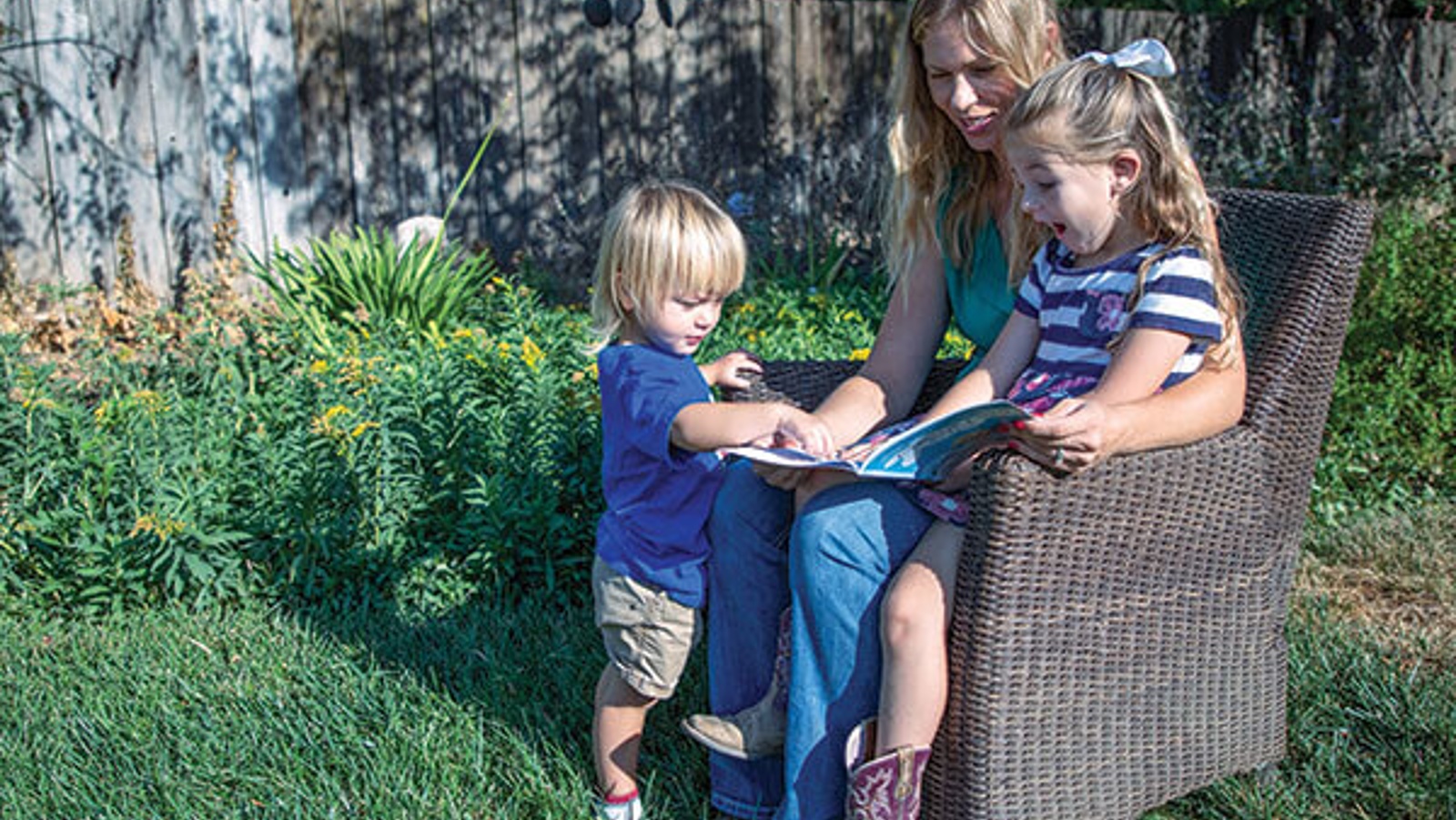
November/December 2021 California Bountiful magazine
Story by Linda DuBois
Photos by Lori Eanes
Dairy farmer spreads the word about raising ewes for milk
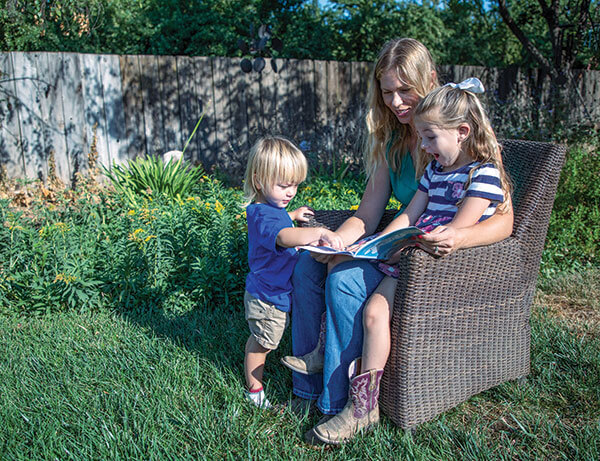
Marcie Davis reads her picture book, "You Can Milk A Sheep Bo Peep," to her children, Jackson and Georgia. Photo: © 2021 Lori Eanes
"Oh, I didn't know you could milk sheep. Are you sure you don't mean goats?"
"You have machines? You don't just hand-milk into buckets?"
Marcie Davis had heard such reactions countless times since she and her husband, Josh, started their sheep dairy, M & J Farms. So, she decided to step up her efforts to spread the word: "Yes. Sheep are milked and have been for thousands of years." She started a blog on their company website, "Confessions of a Crazy Sheep Lady," and began posting on social media.
Through personal stories, Davis has written of the attributes and uses of sheep milk, the process of shearing, practical uses for lanolin (the waxy water-proofing agent in wool) and the everyday challenges of farm life at their Hughson home in Stanislaus County.
After she started making soap for personal use, gifts, donations to 4-H or FFA fundraisers and sales at pop-up shops, she found that even the soap was useful for outreach.
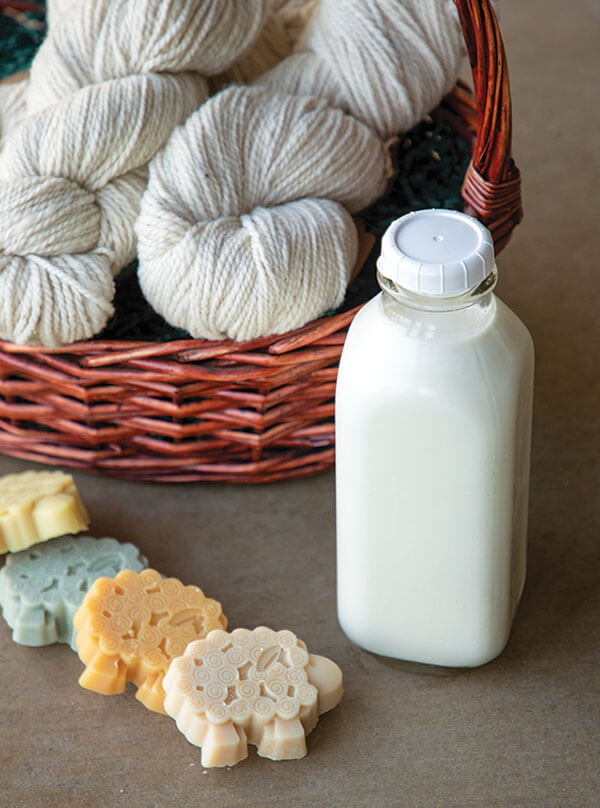
Marcie Davis makes soap from sheep milk and yarn from wool. Photo: © 2021 Lori Eanes
"It kind of starts the conversation," she said. "I'll have my sign out that I have sheep milk soap and people stop because they read that."
While she was getting response from her readers and soap customers, the one audience she wasn't reaching was the next generation. Having always dreamed of writing a book, last February she self-published a children's storybook through Amazon, "You Can Milk A Sheep Bo Peep."
The whimsical story centers around a little girl, Bo Peep (inspired by her daughter), distraught that she can't find her sheep—until her Uncle George shows her where they have gone to be milked. It concludes with a "Fun Sheep Facts" list that could be informative to all ages. (See book review.)
Inside the front cover, Davis writes, "Dedicated to all of my sweet lambs." These include Josh's sons Cole, 24, and Chase, 17, Marcie and Josh's children Georgia, turning 5 in December, and Jackson, 2, and their "angel babies" Cecilia and Francis—twins born prematurely in 2015 who died shortly after birth.
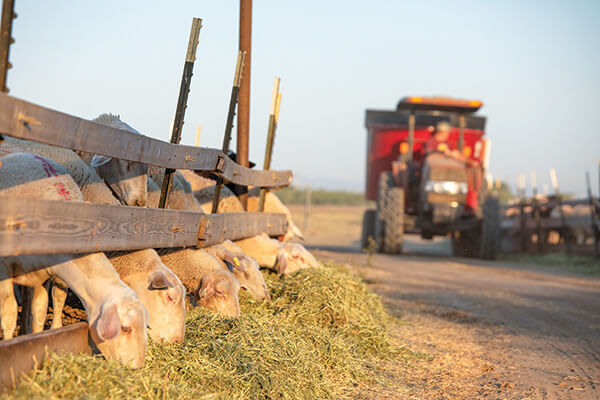
M & J Farms' sheep eat the hay Josh Davis delivers to them by tractor. Photo: © 2021 Lori Eanes
How it all began
The couple's tragic loss turned out to be the impetus for buying their first sheep. Though they had been discussing starting a sheep dairy, they hadn't taken the plunge. But that spring after losing the twins, "He made me go out and we bought nine lambs. He said, 'You need babies to take care of.'"
The "animal therapy" helped, Davis said. "I had to get up early and feed them and it got me out of bed."
The following fall, they launched the full-on business after they were finally able to find enough milking lambs to get started. They bought about 80 East Friesian-Lacaune lambs, a hybrid of two breeds known for high milk production.
"There aren't a lot of options when purchasing dairy sheep," Davis explained. "Most flocks are very small, so finding a large enough group at one time to start is difficult. We found a few for sale here and there, and finally came across a woman selling a large group of older lambs."
A former college and preschool teacher, Davis said the dairy is a way to return to her roots and get outside more. She grew up on a farm just 3 miles from their current home, growing beans, hay, corn and other crops. Now in his 70s, her dad still grows almonds.
For Josh Davis, who grew up in Turlock, farming was a new venture, but the former FFA member who milked cows as a boy grew up interested in agriculture. To support the family, he kept his other job as a senior director of sales for a cooperative. He sees the dairy as a way he can spend more time with his family.
"We wanted to have something that we could do together at home," he said.
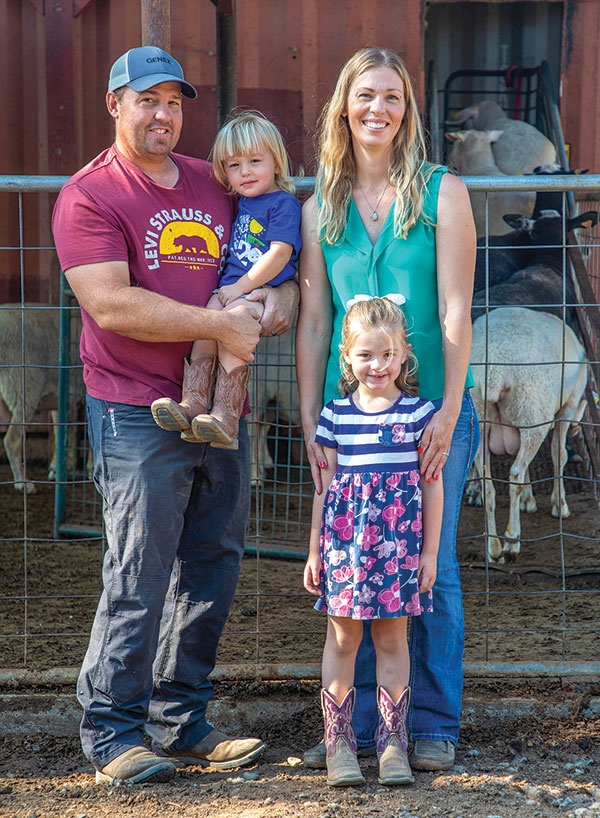
The Davises—Josh, Jackson, 2, Marcie and Georgia, 4—get ready for a busy day on the dairy farm. Photo: © 2021 Lori Eanes
Life on the farm
The family's flock has since grown to about 400 sheep. Though each ewe generates only a half-gallon of milk per day compared to a cow's 6 or 7 gallons, they also require less water and food. Sheep are milked on a seasonal rotation, allowing for at least three months of "time off" to regain nutrients. So, at any one time, the flock produces about 100 gallons of milk per day.
If the market eventually demands it, Davis said they would consider growing their flock even more.
On the management end, she handles the payroll and bookkeeping and he oversees farm operations, recordkeeping and planning the breeding cycle.
The day kicks off when he rises at 5:45 a.m. to feed the sheep.
The milkers (college students interested in agriculture or animal careers) arrive at 6 a.m. to start the four-hour process.
Shortly after, she and the children feed the lambs. Georgia and Jackson "help" by carrying small tools or bottle-feeding the lambs and enjoy being involved in almost everything—even births. Georgia will try to comfort sheep in labor, saying "It's OK, Momma. You're having a baby."
Though most sheep breeds give birth to one or two lambs, the East Friesian-Lacaune can have several. "I think we've had two sets of five in our six years," Davis said. "We'll get triplets; we'll get quadruplets." Their small size makes them more susceptible to illness, she said, so they require extra monitoring and care.
The milkers come back again at 4 p.m., followed by another feeding and a check before bed.
The rest of a typical day is filled with tasks like moving sheep, equipment or fence repairs, checking for new pregnancies—or lambs—and monitoring the animals' health.
"It's a blessing and a curse that we live right here on the dairy. I am on call 24/7," Davis said.
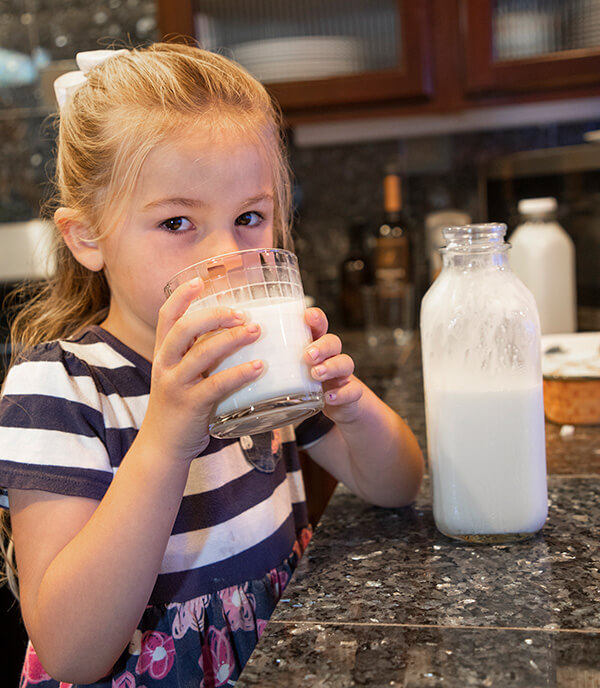
Georgia Davis drinks a glass of milk that came from her family's sheep. Photo: © 2021 Lori Eanes
How to enjoy sheep milk
Sheep milk is similar to cow milk but sweeter, with more protein, vitamins, minerals and "healthy" fat. Because of that extra fat, it makes great ice cream without the need for added cream, Davis said.
She makes ice cream and rice pudding for her family. (See recipe.) But because M & J Farms isn't a licensed pasteurizer, it can't sell milk or its edible products directly to consumers.
Yogurt and cheese made with its milk can be found nationally in select grocery stores under the Bellwether Farms label. Shoppers can find ricotta, a couple of aged cheeses and a fresh cheese log coming in a variety of flavors.
A family-owned creamery near Petaluma in Sonoma County, Bellwether Farms is run by Liam and Diana Callahan.
The creamery purchases milk from several of about nine sheep dairies currently in business in California. Buying from M & J Farms is worth the 300-mile round trip, Liam Callahan said.
"Marcie and Josh work really hard to keep the milk clean and of high quality. I can tell that they care about the animals and doing a good job," he said.
He added that sheep cheeses and yogurts have a "lemony flavor, a little bit tart, which makes any flavors that you've mixed in really bright and kind of jump out."
But it's not just the taste that attracts people. The lactose-intolerant are also fans. Callahan explained that sheep milk contains A2 protein, also found in goat and human milk, as opposed to the A1 protein found in most cow milk that some people have trouble digesting.
No matter the reason, Davis said she's thrilled to know people are enjoying cheese and yogurt made from M & J Farms' milk.
"I see people compliment Bellwether on their products on social media and I want to comment, 'You're welcome!'"
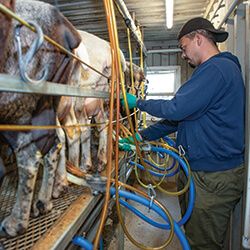
Tre McClellan milks the sheep twice a day at M & J Farms. Sheep have been milked for thousands of years. Photo: © 2021 Lori Eanes
Sheep milk's long history could end in a bright future
Though many in the United States may not be aficionados of sheep milk, much of the world is. Dairy sheep leaders say these animals probably were milked before any others.
"I believe Adam and Eve enjoyed sheep milk. There's a timeline for you!" said Debbie Webster, the U.S. representative for The Dairy Sheep Association of North America.
Throughout known history, sheep have been milked heavily in European, Mediterranean and Middle Eastern countries. However, sheep dairies didn't crop up in the United States until about the mid-1980s.
One of those pioneers was Bellwether Farms in Sonoma County, founded in 1986 by Cindy Callahan, now in her mid-80s. The first sheep dairy in California and the third in the U.S., the business is today run by her son Liam and his wife Diana, who transitioned it to a full-time creamery two years ago.
One of The Dairy Sheep Association's most active members, Liam Callahan has taken several research trips to visit European cheesemakers and in the process has learned a lot about dairy-sheep history. He's noticed three breeds are increasingly used in the U.S. for milking.
The East Friesian, originating from the border area of the Netherlands and northern Germany, is known as having one of the best milk yields.
The national breed of France, the Lacaune, provides a rich milk used for Roquefort cheese and other major French cheeses.
The Assaf, a hybrid created about 75 years ago from the East Friesian and a Middle Eastern sheep called Awassi, originated in Israel but flourished in Spain. It is raised for both milk and meat.
One of the goals of the association for the past few years has been creating a U.S. national flock with genetic improvements.
Both Callahan and Webster can envision a bright future for sheep dairy.
Callahan cites the rise of U.S. goat dairies—which started off as a niche market and then boomed—as an example of the sector's potential.
Webster points out sheep milk's new growth in popularity overseas. For example, China is buying most of the sheep milk from New Zealand and Canada in freeze-dried form to make baby formula.
Her farm has a mentoring program, which she said is key: "I believe the only way to grow an industry is to help future generations by educating, empowering and equipping them."

